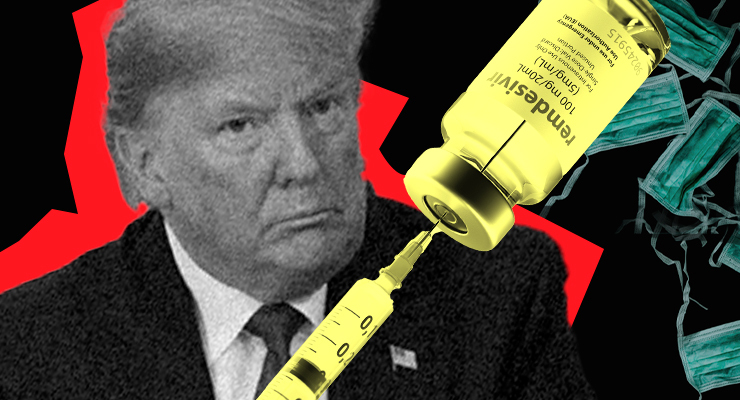
One of the instructive features of developed personality traits — as distinct from mere personal behavioural moments — is their enduring consistency. People with highly defined personalities respond during crises in consistent and predictable ways, and so sharpen our understanding of their personality type.
And thus it has been with Donald Trump, whose hyper-narcissism has defined his time in office. Trump has what I call an Emperor complex: a belief that he is a superior being, tremendously perfect in every way and not subject to the vicissitudes of life.
Certainly, in the relation to the pandemic, Trump’s narcissistic disdain has been evident from the beginning. He has been unwilling to acknowledge COVID’s seriousness and unsympathetic to the suffering of victims and their families. More recently he has failed to show empathy to those staff and supporters callously exposed to infection at his campaign rallies. As always, it’s all about Trump.
Prior to his own COVID diagnosis last week, Trump had been serially dismissive of masks. Now the triumphant Rose Garden reception for his Supreme Court nominee, Amy Coney Barrett, has been identified as the likely source of the spread of the virus to the president, First Lady Melania Trump, Republican members of Congress and White House staff. This was a close-up gathering at which most participants failed to wear masks.
What seems to outsiders as irresponsible behaviour is better understood as reflecting Trump’s belief that ordinary constraints don’t apply to him. As Emperor of All America, Trump believes he possesses the divine right of kings, that he is not accountable to earthly authority (Congress), and is not even subject to the will of the people, whose duty is only to admire and praise him. Most relevantly, he sees himself as special and immune to the risks to which we mortals are subject.
Now in hospital with the virus he has minimised and mismanaged for months, Emperor Trump is behaving according to type. No catastrophic global pandemic (which Trump still described dismissively from hospital as “the coronavirus or whatever you want to call it”) is going to get the better of him, and he will not allow himself to feel diminished by it. That would be an internal admission of vulnerability that he will never countenance, and so he inwardly rejects it.
That is the key personality feature that’s evident through all of this and so many other situations: Trump will never allow himself to feel “weak” or be perceived as weak, and so he will manoeuvre himself to avoid it — to project himself as strong and never at risk, always in command.
This was obvious in his initial response to the pandemic. “They tried the impeachment hoax”, he said on February 28. “This is their new hoax.”
A little over two weeks later, when the rising case numbers were unavoidable, Trump manoeuvred to insist he knew before anyone how serious COVID-19 was: “I’ve always known this is real — this is a pandemic. I felt it was a pandemic long before it was called a pandemic.”
Notice that while he shifts his ground, Trump maintains his superiority. In his first call, COVID is a fraud, a nothing. When the infection rate makes that position untenable, he simply claims that he knew COVID was a bigger deal before anyone — and so he’s still on top of it.
The seeming contradiction in his statements about COVID was evident in his comments to celebrated journalist Bob Woodward. His claim that he deliberately played it down the virus to the US public to avoid panic gives him a win on both fronts. He can minimise the risk, but also tell himself that, even if it’s a big deal, he is strongly in control of it, never subordinated to it, and he is never made to feel weak.
Quite apart from the political spin involved, Trump’s attitude allows him to feel like he’s on top of things, that there’s nothing going on that has got the better of him.
Now with his hospitalisation, the imperative to not appear weak has come front and centre again. That is why Trump initially resisted the entreaties of his aides that he go to Walter Reed Medical Centre for treatment. When he finally relented, he minimised to staff and the media the severity of his condition. This approach was undone, however, by other officials disclosing that interventions like emergency oxygen were involved. Trump was reportedly furious.
Finally, in his four-minute public video released on the weekend, Trump minimised his condition and invoked his special status in praising the drugs he was given “as miracles coming down from God”.
“I feel much better now,” he said from hospital. “I think I’ll be back soon … and I’m fighting for people all over the world, we’re going to beat it.”
Trump even did a drive-by for his supporters outside the hospital, saying in advance that they had “more enthusiasm than maybe anybody”.
As ever, Emperor Trump’s world is the best, the most tremendously perfect and amazing place and he is without peer or blemish on the world stage. But in an October surprise, his rule is now at the mercy of a force that respects non-one, not even royalty.








After Trump’s put down of “socialised” medicine during the “debate”, I wonder if Mr Trump will share with the rest of the world the bill he intends to pay for his stay in hospital. Getting the very best treatment on the public dime ?
Low-info supporters are going to see a headline, think he’s recovered and been released early. Well played, Satan.
What it all brings to my mind is the old tale of the Emperor’s New Clothes. It took a child to state the truth: the emperor has no clothes.
My “thoughts and prayers” are with him..
The virus i mean.
Sic him rex!
Trump’s delusions of grandeur and superiority would have no wider consequences if he was not backed up by a political party that does all it can to promote and inflate his delusions for their own corrupt and self-serving ends while their country goes to hell. Bill Barr stands out among those currently in favour in Trump’s court with his total dedication to establishing absolute unchecked power in the presidency. Trump[‘s ascendancy is the tale of Ebenezer in the old song Lily the Pink made flesh:
Old Ebenezer thought he was Julius Caesar
And so they put him in a home [AKA The White House]
Where they gave him medicinal compound [bleach, hydroxychloroquine?]
And now he’s emperor of Rome
Mitch McConnell gives Barr a run for his money. McConnell has zero interest in serving for all Americans.
That’s true, but McConnell just uses Trump to achieve his own agenda and would turn on him the moment it became expedient; Barr on the other hand really is dedicated to giving Trump absolute power putting him beyond the reach of any authority. Barr said as much in 2018 when he applied for the Attorney General post